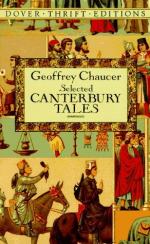|
|
The Canterbury Tales Topic Tracking: Loyalty
Loyalty 1: This first mention of loyalty falls in the realm of the Knight's Tale. The wives of the murdered soldiers feel loyal to their fallen husbands and desire a proper burial. They would be disloyal to their wedding vows if they allowed the bodies to rot. Furthermore, Theseus felt a twinge of loyalty to humanity as he returned with troops to Thebes to bury the soldiers. Loyalty and honor to mankind are motivating factors in his decision to take over Thebes and bury the soldiers.
Loyalty 2: Both Palamon and Arcite have always remained loyal to their hearts and to their love for Emelye throughout the tale. All three people involved in the love triangle also fall back on a faith and a loyalty to a God. Emelye prays to Diana, while Palamon prays to Venus and Arcite to Mars. Their faith in these three deities will hopefully aid them in their battle.
Loyalty 3: Nicholas and Alison have an affair, proving Alison's disloyal and unfaithful behavior to her husband John. This is just one of the numerous examples of a wife making a cuckold of her husband. The affair leads to much more outlandish behaviors of disloyalty, such as the plan they devise to trick John.
Loyalty 4: Symkyn is deceptive and disloyal to the young students from Cambridge. He manipulates their actions so that he can steal their corn and then keenly offer them lodgings as a friend. His actions are unfaithful to his fellow man and also to his supposed new acquaintances, for these actions stem from lies.
Loyalty 5: Although by the end of the tale the miller's wife tries to help him, there is much disloyalty and unfaithfulness in this tale. Molly sleeps with Aleyn, while Symkyn's wife and John make him a cuckold, again illustrating the futility of marriage vows.
Loyalty 6: Constance accepts her fate of marrying the Sultan, whom she does not love, because she knows that women must be loyal to their families and subject to men. She is faithful to her father and to the rules of the land and time.
Loyalty 7: The question of loyalty resides in the knight of this tale. Can he be loyal to himself and an older woman, or does he need a young beautiful bride? The knight, chooses the younger woman; however, out of loyalty and faithfulness, he kisses the old woman as she is. Because of this faith, he gets both the faithful wife and the young beautiful maiden in one body.
Loyalty 8: In this tale, loyalty seems to be the object of all tests. Walter perpetually tests his common wife, Griselde, with all sorts of random and cruel trials for her loyalty. She passes every time, and eventually proves herself to her husband.
Loyalty 9: May and Damian conspire together for a possible affair, proving May's disloyalty to her husband and Damian's disloyalty to his master. January will learn that his brother was correct about marrying a younger woman.
Loyalty 10: Dorigen is so loyal to her lover that she would do anything to save him from death. The question arises as to what true loyalty is: Is it giving herself to another man for the sake of her true love, or is it dying instead of becoming disloyal and unfaithful to her lover? Regardless, she makes a pact with Aurelius to save her beloved.
Loyalty 11: This tale brings up another illustration of true loyalty. Arviragus tells Dorigen to follow through on her promise, to remain loyal to her word, despite his pain and despite the heartbreak that would ensue because of it. He teaches her and illustrates through his words and actions the importance of loyalty and faith in one's word. Because of Arviragus' actions, Aurelius does not force Dorigen into having sexual relations.
Loyalty 12: Although supposedly three friends, these three riotous men fall into avarice and have no loyalty to one another. Immediately after being confronted with the opportunity of wealth, their loyalty to each other is lost. The third rioter goes to town and buys poison to kill the other two. However, as soon as he returns, his supposed loyal friends, who soon drink the poisoned wine and die as well, stab him to death.
Loyalty 13: Dan John and the merchant's wife engage in a brief sexual encounter, resulting in the wife's disloyalty to her husband and John's disloyalty to his supposed friend. The two conspirators are unfaithful to the merchant by not only sleeping together, but by allowing John to manipulate the money owed from the wife to the merchant.
Loyalty 14: Many of the mini-tales in the Monk's stories die because of their disloyalty to either their family or God. Because of their unfaithfulness, the monk lists their brutal deaths in order to teach a lesson. Loyalty is vitally significant for a long and happy life in the medieval period.
Loyalty 15: The priest and canon's exchange of information on how to falsify silver illustrates deception in society. This deception is a type of disloyalty to their fellow man and can bring more harm than good. It is also an example of disloyalty within the Church to both God and their fellow men.
Loyalty 16: Phoebus's wife is unfaithful to him with another man. The white crow witnesses this display of disloyalty and tells Phoebus, forever condemning him into ebony solitude. This tale is another example of a wife acting unfaithful and disloyal to her husband.




